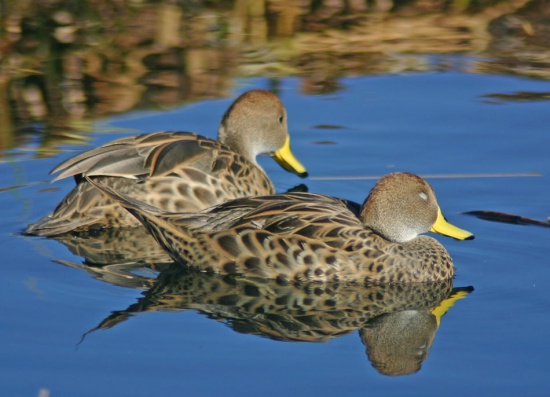- Anas georgica
Identification
61-71cm. Pale warm brown head and neck, finely mottled darker, throat, buffish-brown body, with conspicuous blackish-brown feather centres, spotted on breast and more conspicuous along flanks and upperparts, pale belly, brown, long and pointed tail, grey-brown upperwing, with buff tips to greater coverts; secondaries blackish-green, with broad buff tips, bright yellow bill with black tip and culmen.
Distribution
From southern Colombia, Ecuador, Peru, Uruguay, southern-eastern Brazil, through Argentina, Chile to Tierra del Fuego, and additionally in Falkland Islands South Georgia Islands.
Taxonomy
Three subspecies are recognized:
- georgica is only found in South Georgia Islands
- spinicauda is the widespread South American form also found in the Falklands
- nicefori from central Colombia is apparently extinct
All three forms have in the past been considered distinct species, and their lumping apparently was not accompanied by any arguments1.
Habitat
Variety of wetlands, from high-elevation lakes and marshes to lowland lakes and rivers in open country.
Behaviour
Nests are made on the ground, lined with down and grass, and usually hidden among vegetation and close to water. 4 to 10 eggs are laid.
They feed by dabbling and up-ending, wading in shallow water or grazing in waterside grasslands, and sometimes by diving.
References
- Restall et al. 2006. Birds of Northern South America. Yale University Press. ISBN 9780300124156
- Clements, James F. 2007. The Clements Checklist of Birds of the World. 6th ed., with updates to October 2007. Ithaca: Cornell University Press. ISBN 9780801445019
- Alvaro Jaramillo. 2003. Birds of Chile. Princeton Field Guides. ISBN 0-691-11740-3





